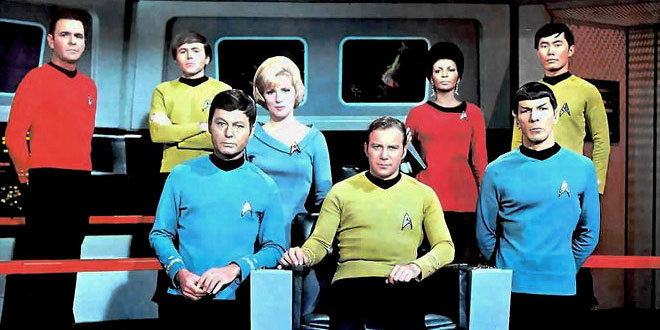Cinema has depicted many legendary showdowns: Batman vs. Superman, Alien vs. Predator, Freddy vs. Jason, Iron Man vs. Captain America. However, in an age when cinema-goers clamor for the next great showdown, it is easy to forget one of the oldest, most epic, most legendary matchups in film history. Well, maybe not film history. Television history. The epic showdown between Captain Kirk and an alien known only as the Gorn is pure genius. What could be better than watching William Shatner fight a guy in a rubber suit set to some beautifully cheesy music?
While it is certainly easy to look back at the production value of the original Star Trek series and laugh (and laugh, and laugh), it would be foolish to write off the show completely because of its age. When the Enterprise first flew across television screens 50 years ago, few thought that it was going to leave the cultural footprint that it has. The original series only lasted three seasons, and experienced a myriad of production issues, but still managed to lay the groundwork for four more live-action television series (with a fifth coming in 2017), thirteen films, and countless novels and animated productions. With the show celebrating its fiftieth anniversary this year, it is worth asking the question: why has this show persevered when so many others sputtered and failed to leave as indelible a mark?
Quite simply, from a creative standpoint, Star Trek’s universe is wide open in terms of the stories that can be told. There is, quite literally, a universe available for writers to create characters, design entire alien races, and write different stories. Of the many productions that have fallen under the Star Trek umbrella, a few themes have remained constant: a diverse cast of characters, conflict with alien races, and some sort of important (oftentimes titular) spaceship. But there appears to be more, in the makeup of the show, that has allowed it to persevere through so many years.
What makes Star Trek so unique is its optimism. The show dares to tell of a future without war or conflict between humans. It imagines a future where humanity has transcended earthly differences and worked together to develop technologies that allow humans to travel beyond the Milky Way. Race, ethnicity, and sex do not matter on the Enterprise (or whatever spaceship is in the story). In today’s tense climate, it is a breath of fresh air to see a television show tell such post-racial stories.
Moreover, Trek tries to tell stories set in the future that actually bode well for humanity’s future. This may seem trite, but it actually makes the show quite unique. So much of our pop culture is predicated on telling gloomy post-apocalyptic stories. Whether it is the Terminator franchise, or Mad Max, or The Walking Dead, so much of our entertainment relies on incredibly depressing and dour depictions of where our world is headed. If we don’t kill ourselves off, some super-computer, virus, or natural disaster will. Star Trek does not stop to consider these possibilities. Instead, the show tells of a world that barely survived a third world war, but instead of trying to gain resources or power, looked to the stars for its future. Across all of the Trek shows, novels, and films, this one theme is the most prevalent: hope in humanity’s future.
I don’t think that the 50th anniversary of the show could have come at a better time. With so much doubt, anger, and pessimism present in our pop culture (and actual culture) today, we need Star Trek more than ever. We need to be reminded of the wonders we can achieve as a human race. Indeed, Star Trek Beyond was one of the best films of an incredibly underwhelming summer because it took a chance on having fun. Instead of telling some sort of the-end-is-nigh type of story (see Independence Day: Resurgence), Beyond told a wonderfully self-contained story that entertained and satisfied audiences. It’s a shame that its box office returns were the worst of the three rebooted films, and now doubt has been cast on the cinematic future of the franchise. A fourth film has been greenlit, but it could be the final film for the rebooted cast, who have mostly found solid careers outside of Trek. However, with Bryan Fuller at the helm of Discovery, a new show arriving next year, one thing is clear: Star Trek will boldly go through its 50th anniversary with its eye on the 100th anniversary, continuing to tell stories of the potential of mankind.






